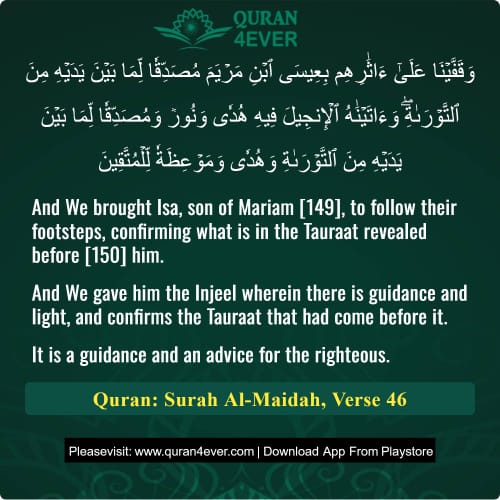
Transliteration:( Wa qaffainaa 'alaaa aasaaarihim bi 'Eesab ni Maryama musaddiqal limaa baina yadaihi minat Tawraati wa aatainaahul Injeela feehi hudanw wa noorunw wa musaddiqal limaa baina yadaihi minat Tawraati wa hudanw wa maw'izatal lilmuttaqeen )
“And We brought Isa, son of Mariam…”
This verse introduces Hazrat Isa (Jesus, peace be upon him) as a continuation of the prophetic mission:
The title “son of Maryam” emphasizes his miraculous birth without a father.
He is identified by his mother to highlight this miracle and refute any notion of divinity.
He is also regarded as the last prophet among the Israelites, coming after all previous prophets of Bani Isra’il, thus being titled the Confirmer.
“…confirming what is in the Tauraat revealed before him.”
Hazrat Isa (peace be upon him) came not to nullify, but to affirm the original teachings of the Taurat.
The Injeel both confirmed and abrogated parts of the Taurat.
This is not contradictory, as confirmation means affirming truth and origin, while abrogation refers to legislative replacement where necessary.
📌 Just as the Holy Qur’an confirms all previous divine scriptures while bringing final legislation, the Injeel confirmed the Taurat but superseded parts of its law.
“And We gave him the Injeel wherein there is guidance and light…”
The Injeel was filled with divine guidance, spiritual light, and reminders for those who feared Allah.
It served as a moral and legal code for Isa’s (peace be upon him) followers, reaffirming Tawheed and obedience to divine law.
Hazrat Isa (peace be upon him) upheld the divine message, guiding his people with sincerity, knowledge, and the revealed truth of the Injeel.
46. And in their footsteps, We sent `Isa, son of Maryam, confirming the Tawrah that had come before him, and We gave him the Injil, in which was guidance and light and confirmation of the Tawrah that had come before it, a guidance and an admonition for those who have Taqwa. 47. Let the people of the Injil judge by what Allah has revealed therein. And whosoever does not judge by what Allah has revealed, such are the rebellious.
Allah said,
(and We sent…) meaning, We sent
(in their footsteps) meaning the Prophets of the Children of Israel,
(`Isa, son of Maryam, confirming the Tawrah that had come before him,) meaning, he believed in it and ruled by it.
(and We gave him the Injil, in which was guidance and light) a guidance that directs to the truth and a light that removes the doubts and solves disputes,
(and confirmation of the Tawrah that had come before it,) meaning, he adhered to the Tawrah, except for the few instances that clarified the truth where the Children of Israel differed. Allah states in another Ayah that `Isa said to the Children of Israel,
(. ..and to make lawful to you part of what was forbidden to you.) So the scholars say that the Injil abrogated some of the rulings of the Tawrah. Allah’s statement,
(a guidance and an admonition for those who have Taqwa.) means, We made the Injil guidance and an admonition that prohibits committing sins and errors, for those who have Taqwa of Allah and fear His warning and torment. Allah said next,
(Let the people of the Injil judge by what Allah has revealed therein.) meaning, so that He judges the people of the Injil by it in their time. Or, the Ayah means, so that they believe in all that is in it and adhere to all its commands, including the good news about the coming of Muhammad and the command to believe in and follow him when he is sent. Allah said in other Ayat,
(Say “O People of the Scripture! You have nothing (guidance) until you act according to the Tawrah, the Injil, and what has been sent down to you from your Lord.”) and,
(Those who follow the Messenger, the Prophet who can neither read nor write whom they find written with them in the Tawrah…) until,
(…successful.) Here, Allah said,
(And whosoever does not judge by what Allah has revealed, such are the rebellious.) meaning, the rebellious and disobedient of Allah who prefer falsehood and abandon truth. We mentioned before that this Ayah was revealed about the Christians, and this is evident from the context of the Ayah.
(5:46) And We sent Jesus, the son of Mary, after those Prophets, confirming the truth of whatever there still remained of the Torah. And We gave him the Gospel, wherein is guidance and light, and which confirms the truth of whatever there still remained of the Torah,[76] and a guidance and admonition for the God-fearing.
76.The Messiah did not expound a new religion. That very religion which had been the religion of all the Prophets was also his religion, and it is towards that religion that he called people. He believed in the true teachings of the Torah which were extant in his time, and the Gospels (Injil) confirm this (see, for example, Matthew 5: 17-18). The Qur’an repeatedly stresses the fundamental fact that none of the Prophets of God, no matter in which part of the world they appeared, denied the Prophets who had preceded them. On the contrary, each Prophet confirmed the message of his predecessors and sought to promote the mission which was the sacred legacy of them all. God did not reveal any of the Books in order to repudiate the previous ones; each confirmed and supported the preceding ones.
[267]- i.e., following the tradition of the prophets of the Children of Israel.

For a faster and smoother experience,
install our mobile app now.
Related Ayat(Verses)/Topics